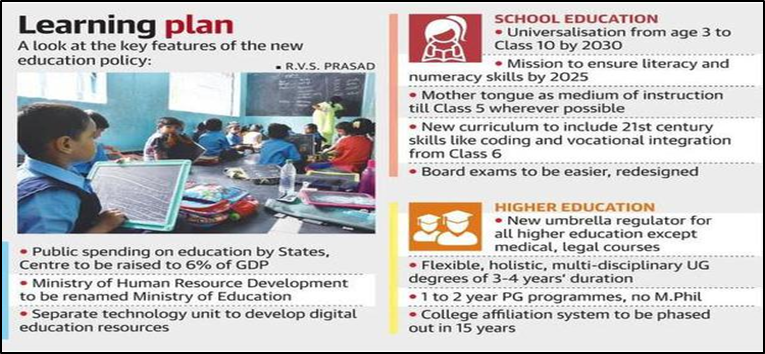In News:
- To mark the completion of two years of launch of National Education Policy 2020, the union Home Minister recently launched a slew of initiatives related to education and skill development.
- At the event the Home Minister stated that promotion of regional languages is essential to unlock the full potential of Indian talent.
- He highlighted the fact that whether it is technical education, medical education or law education, the role of mother tongue and Indian languages are important.
- He further mentioned that there is a close relationship between research and the education system in the mother tongue.
- One who thinks in his/her own language can do well in research because his original thinking ability is developed in his/her own language.
What’s in today’s news:
- National Education Policy (NEP) 2020 – background, about, key takeaways
- News Summary
National Education Policy (NEP) 2020:
Background:
- An NEP is a comprehensive framework to guide the development of education in the country.
- The first education policy came in 1968 on the recommendation of the Education Commission, headed by D S Kothari.
- The second education policy came in 1986, which was replaced by the third education policy - NEP 2020.
About NEP 2020:
- The NEP 2020 was drafted based on the recommendations of a panel led by former ISRO chief Kasturirangan.
- The policy is a comprehensive framework for elementary to higher education, as well as vocational training in both rural and urban India.
- The policy aims to transform India's education system by 2040.
Key takeaways of the NEP 2020:

- It proposes major changes including -
- Opening up of Indian higher education to foreign universities,
- Dismantling of the UGC and the All-India Council for Technical Education (AICTE),
- Introduction of a four-year multidisciplinary undergraduate programme with multiple exit options, and
- Discontinuation of the M Phil programme.
- In school education, the policy focuses on -
- Overhauling the curriculum, easier Board exams, a reduction in the syllabus to retain core essentials and thrust on experiential learning and critical thinking.
- “5+3+3+4” design (instead of 10+2 structure), which corresponds to the age groups 3-8 years (foundational stage), 8-11 (preparatory), 11-14 (middle) and 14-18 (secondary).
- Teaching students (until Class 5) in their mother tongue or regional language.
News Summary:
- Recently, Union Minister of Home Affairs participated in a ceremony commemorating the second anniversary of National Education Policy 2020.
Key Initiatives launched at the ceremony:
- 100+ National Skills Qualifications Framework (NSQF) aligned future skill qualifications to be developed under 6 key areas:
- Automation in Industries (Manufacturing/Service) and Industry 4.0
- Infrastructure Connectivity (EVs and Drones)
- Electronics Manufacturing & VLSI
- Technology Infrastructure including 5G & Cyber Security
- Digital Emerging Technologies
- Indigenous R&D
- Vidya Amrit Portal: It is a Digital Project to scale up the micro-improvements taking place in school education in different parts of the country.
- National Initiative for School Heads and Teachers Holistic Advancement (NISHTHA): ECCE: This is to prepare an initial cadre of high-quality Early Childhood Care and Education (ECCE) Teachers in Anganwadis.
- School Innovation Policy: National Innovation and Entrepreneurship Promotion Policy guides school education systems on various measures that may be adapted to promote a learning environment, irrespective of their age.
- National Credit Framework (NCrF)
- NCrF is being launched at the school level, starting from Class 5. It proposes to bring the entire education system from school onwards into the academic credit regime
- The credit framework will give due weightage to both academic and extracurricular activities like sports, yoga and music for assessment.









